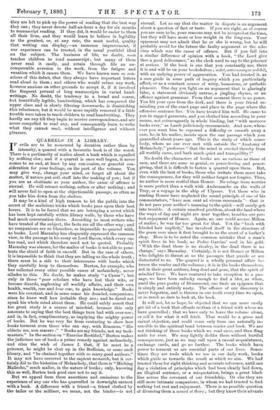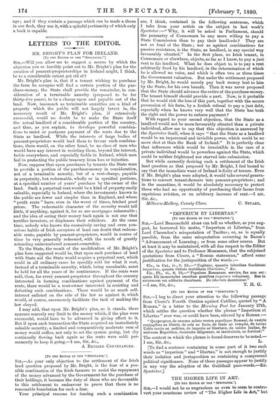QUARRELS IN A LIBRARY.
IF evils are to be measured by duration rather than by intensity, a quarrel with a favourite book is of the worst. There is a pertinacity of malice about a book which is equalled by nothing else; and if a quarrel is once well begun, it never comes to an end, at least by any consession, or graceful con- sideration for your feelings, on the part of the volume. You may give way, change your mind, or forget all about the matter, if nature put soft stuff into the making of you; but if you are as obstinate as your author, the cause of offence is eternal. He will retract nothing, soften or alter nothing ; and will never fail to open at the objectionable passage, as often as you take him down from the shelves.
It may be a kind of high treason to let the public into the secret of the malicious tricks which books pass upon their best lovers. It is to be feared that we are betraying a secret which has been kept carefully within library walls, by those who have had much conversation there. According to most writers who have treated of the subject, the facts are all the other way ; and no companions are so blameless, so impossible to quarrel with, as books. Lord Macaulay has eloquently expressed the common view, in the passage in his essay on Lord Bacon, which every one has read, and which therefore need not be quoted. Probably Macaulay was sincere, for the malice of books is not able to pene- trate the shield of faith in oneself. But in the case of others, it is impossible to think that they are telling us the whole truth ; there must be a side to their intercourse with books which they carefully keep to themselves. Burton, for example, who has collected every other possible cause of melancholy, never alludes to this. No doubt, he makes study "a Cause"; but only in those "poor scholars who have lost their wits, or become dizards, neglecting all worldly affairs, and their own health, wealth, ease and beme ease, to gain knowledge." Books were his constant, and in some sense his dreaded, companions, .since he knew well how irritable they are; and he dared not speak his whole mind about them. He could safely assert that too great study is a source of mischief, because this only amounts to saying that the best things turn bad with over-use; and is, in fact, complimentary, as implying the mighty power .of books. But he was very far from venturing to show how books torment even those who can say, with Erasmus, "His oblecto me, non macero :" "Books are my friends, not my task- masters." In the section on "Exercise Rectified," Burton makes the judicious use of books a prime remedy against melancholy, :and cites the wish of James I. that, if he must be a prisoner, he might be shut up in the Bodleian, or some such library, and "be chained together with so many good authors." It may not have occurred to the sapient monarch, but it cer- tainly did to the historian of Melancholy, that there is "Miching M.allecho," much malice, in the nature of books ; only, knowing this so well, Burton took good care not to say it.
But we appeal from these assertions and omissions to the experience of any one who has quarrelled in downright earnest with a book. A difference with a friend—a friend clothed by the tailor or the milliner, we mean, not the binder—is not eternal. Let us say that the matter in dispute is an argument about a question of fact or taste. If you are right, as of course you are sure to be, your reasons may not be accepted at the time, but they will have more or less weight in the long-run. Your opponent may not admit that he or she is wrong, but he will probably avoid for the future the faulty argument or the sole- cism which was the cause of offence. But if you fall into a similar difference of opinion with a book, "the Lord give thee a good deliverance," as the clerk used to say to the prisoner at assizes. If the book is one that you constantly use, there it is and will be on your bookshelves ; sed,et,aeterimnique sedebit, with an undying power of aggravation. You had trusted it, as a sure guide in some path of inquiry which you particularly affect, or as a constant source of witty, humorous, or pathetic
pleasure. One day you light on an argument that is glaringly false, a statement obviously untrue, a jingling rhyme, or an offence against grammar. From that moment there is no peace. You lift your eyes from the desk, and there is your friend re- minding you of the exact page and place in the page where the offensive sentence lies. You have treated him well. He came to you in ragged garments, and you clothed him according to your means, not extravagantly in whole binding, but "with morocco backs ever," as Lamb judiciously recommends. And now, when- ever you want him to expound a difficulty or smooth away a care, he, in his malice, insists upon the one passage which you quarrelled about years ago. This is the study of which some- body, whom no one ever met with outside the "Anatomy of Melancholy," professes "that the mind is erected thereby from all worldly cares, and hath much quiet and tranquillity !"
No doubt the characters of books are as various as those of men, and there are some so genial, so peace-loving and peace- giving, that it is difficult to fasten a quarrel upon them. But, even with the best of books, those who irritate them must take the consequences, for they will neither forget nor forgive. Thus, no author is more restful than Homer. No refuge from worries is more perfect than a walk with Andromache on the walls of Troy, or a voyage in the ship of Ulysses. Yet those who in reading Homer have neglected the sound principle of one of his commentators, a haec non sunt ad vivum resecanda "—that is do not pare your author's meaning to the quick—will surely get into trouble. A certain unsolved problem, about the land where the ways of day and night are near together, troubles our per- fect enjoyment of Homer. Again, no one could accuse Milton of malice; he was far too great for that. Yet the "bush with frizzled hair implicit," has involved itself in the structure of the poem ever since it first brought to us the scent of a barber's shop. Here is to be noted the common mistake that a man's spirit lives in his book, as Pedro Garcias' soul in his gold. "With the dead there is no rivalry, in the dead there is no change," says Macaulay. Certainly, it is not Homer or Milton who delights to thrust at us the passages that puzzle or are distasteful to us. The quarrel is a wholly personal affair be- tween the reader and the volumes ; it is in the books themselves, not in their great authors, long dead and gone, that the spirit of mischief lives. We have ventured to take exception to a pas- sage, we have been unlucky enough to find a blot, as when, amid the pure poetry of Drummond, one finds an epigram that is simply and entirely nasty. The offence of our discovery is never forgotten, and is thrown in our teeth every time we open, or so much as dare to look at, the book.
It will not, let us hope, be objected that we can more easily get rid of a book that offends us than of a friend with whom we have quarrelled ; that we have only to leave the volume alone, or sell it for what it will fetch. That would be a gross and carnal objection, and could come only from one naturally in- sensible to the spiritual bond between reader and book. We are not thinking of those books which we read once, and then fling aside for ever. We may lightly dislike them without hurtful consequences, just as we may call upon a casual acquaintance, exchange cards, and go no further. The books which have power to torment us are essential parts of our lives. Some- times they are tools which we use in our daily work, books which guide us towards the result at which we aim. We had trusted them for right thinking and accurate reference, until one day a violation of principles which had been clearly laid down, an illogical sentence, or a misquotation, brings a great black line across the covenant of our friendship. Or else they are still more intimate companions, in whom we had trusted to find nothing but rest and enjoyment. There is no possible question of divorcing them a mensd et tlioro ; but they know their advent- age ; and if they contain a passage which can be made a thorn in our flesh, they use it, with a spiteful pertinacity of which only a book is capable.



































 Previous page
Previous page